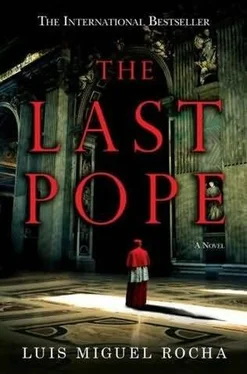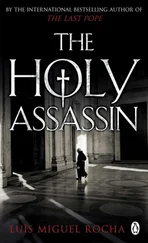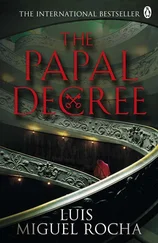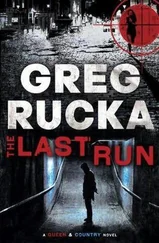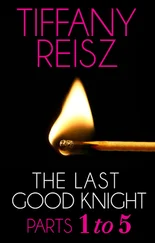He was responsible for the security of Vatican City. The protection system of the city consisted of only a few inner patrols and a few guards at the most relevant, emblematic posts. Pope John XXIII had abolished the practice of posting two soldiers nightly by the door to his private quarters. The closest guard now was at the top of the stairs of the terza loggia. This was just a symbolic post, since the third floor was little used even during the day. Anyone could see that someone with bad intentions could easily enter Vatican City, and he would be right.
Hans went into his office and sat at his desk. He opened a dossier and leafed through it. It was just a list of bills that he had to pass on to his superior in the morning. He closed it after a few seconds. It was useless. He couldn’t concentrate.
“What the hell!” he grumbled, “I need to get some fresh air.”
He left his office not bothering to close the door and walked out of the Swiss Guard building, wandering through the inner gardens and then to the plaza. He passed two soldiers sitting on the steps. Both had dozed off.
I seem to be the only one who can’t sleep, he thought as he woke them with a tap on the shoulder. The startled guards jumped up.
“Sir, pardon me, sir, excuse us,” they both said.
“Don’t let it happen again,” Hans warned. He knew his men had just been through a very intense period of work. A little more than a month earlier, on the sixth of August 1978, Giovanni Battista Montini, better known as Pope Paul VI, had died in Castel Gandolfo, the papal summer residence. The funeral rites of a pontiff lasted several days, and the Swiss Guard did not leave the body of the deceased pope unattended for an instant. Four men stood in stationary guard, one on each corner of the catafalque. Numerous world leaders and heads of state paraded by, paying their last respects to His Holiness.
Once the funeral ended, preparations began behind closed doors for the conclave. Days off were canceled and the amount of work doubled. The last conclave was held on August 25, exactly twenty days after the pope’s death, close to the allowed limit of twenty-one days. Despite the brevity of the conclave, lasting only one day, the habitual frenzy around the new pope had begun. Only a few days before had things returned to normal.
Taking leave of the two sleepy guards, Hans continued his walk.
He couldn’t avoid a feeling of ownership about everything around him. At a distance he saw Caligula’s obelisk, in the middle of Saint Peter’s Square. How ironic: a tribute to a psychopath right in the center of the most sacred place in Catholicism. He continued slowly, feeling the soft morning breeze on his face. Suddenly, something attracted his attention. To his left rose the Apostolic Palace, and on the third floor the lights in the pope’s bedroom were on. He looked at his watch: 4:40 A.M.
“This pope wakes up early.” When Hans was coming back with his mother after dinner, at about eleven, the lights were on then as well. Vigilant, like any proud Swiss Guard, he decided to go back to the soldiers he had caught dozing off. Now they were talking to each other. The sergeant had cured them of their sleepiness.
“Sir,” they greeted him in unison.
“Tell me something, did His Holiness ever turn off his lights during the night?”
While one of them hesitated, the other answered with assurance.
“The lights have been on since I started my patrol.”
Despite having caught them dozing, Hans knew they must have been inattentive for only a few minutes.
“How odd,” he mumbled.
“His Holiness usually turns his lights on at about this time. But last night he didn’t turn them off at all,” the guard added. “He must have been working on those changes people are talking about.”
“That’s no concern of ours,” Hans answered, and changed the subject. “Is everything in order?”
“Everything’s in order, sir.”
“Very well. I’ll see you later. Keep your eyes peeled.”
As he went back to the Swiss Guard building, he felt his eyelids finally getting heavy. He could still sleep for a couple of hours. He glanced again at the still-lighted pope’s quarters. No doubt things are going to change around here, he thought, with a half grin. Now he could sleep in peace.
IT HAD BEEN fifteen minutes since Sister Vincenza had placed the silver tray on the small table by the door to Don Albino Luciani’s private quarters. It was time to go back and make Don Albino get up and take his medication.
Again a chill went down her spine as she crossed the somber corridor. She would face Don Albino and stand respectfully but firmly until he had taken his blood pressure medication. It was too low, according to Don Giuseppe. The medication consisted of a few white, tasteless pills that the pontiff always took with a gesture of mock surprise. This was one of Vincenza’s responsibilities, as was giving him an injection to stimulate his adrenal glands before he went to bed. Sometimes she also had to make sure he had taken his vitamins after meals.
Don Albino used to joke with Sister Vincenza and gently reproach her for being so punctual, coming “religiously” between four thirty and four forty-five every morning to administer the medication that kept his blood pressure at the appropriate level.
Then Don Albino took his bath. Between five and five thirty he tried to improve his English with a taped correspondence course, a routine he resisted changing. After that, the pontiff prayed in his private chapel until seven. That simple routine was a remnant of life in his former residence, and afforded him some relief from the enormous burden the cardinals had placed on him.
As the nun reached Don Albino’s quarters, she couldn’t help but show her distress. That morning the whole routine, maintained for years, was crumbling. The silver tray with the pot of coffee and cup and saucer was still in the same place she had left it a few minutes earlier. She lifted the lid of the coffeepot to see if it was still full. It was. In almost twenty years nothing like this had happened, and Don Albino Luciani had never failed to respond to her greeting with a kind “Good morning, Vincenza.”
Actually, that wasn’t exactly right; some of the details had been altered. Before moving here, Sister Vincenza used to knock at the door and come in with the coffee tray, personally handing it to Don Albino. This routine was vehemently rejected when the new papal assistants found out. According to them, this was in flagrant violation of protocol. So, to please everybody, they reached a compromise. The nun was to continue to bring the coffee every morning but would leave the tray by the door to Don Albino’s private quarters.
Leaning her head against the door again, Sister Vincenza held her breath, trying to listen for any sound coming from inside the room. She didn’t hear anything or sense any movement. I don’t know whether I should knock again, she thought, and finally knocked timidly on the wooden door.
“Good morning, Don Albino,” she whispered.
She stood back from the door and examined it, wondering what else to do. “In Venice I just walked right in without a fuss,” she muttered.
From the bottom of the door, a fine line of light escaped. “Well, this means that Don Albino must be up already.” She knocked decisively at the door.
“Don Albino?”
No response. She knocked again softly, but silence was the only answer. She had no alternative but to enter the room, despite the dictates of protocol. She placed her hand on the golden doorknob and turned it.
“If I were to please all those secretaries, I would never find out whether Don Albino is up or still sleeping.”
She tiptoed in. The pope was still sitting in bed, propped up with pillows, his glasses on, some papers in his hand, his head turned a bit to the right. The happy expression and kind smile that used to charm everyone around him had turned to a grimace of agony. Vincenza quickly went to him with a tremulous heart. She paid no attention to her own weak condition. With red, teary eyes she held Don Albino’s hand to take his pulse. One, two, three, four, five seconds-
Читать дальше
